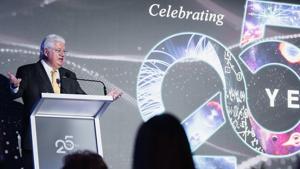Science
Perimeter Institute Celebrates 25 Years of Quantum Innovation

The Perimeter Institute for Theoretical Physics in Waterloo, Canada, commemorated its 25th anniversary on September 25, 2023, marking a significant milestone in the field of theoretical physics and quantum technology. Founded in 2000 with a generous donation of over $100 million from co-founder of BlackBerry, Mike Lazaridis, the institute has evolved into a global hub for research, education, and innovation in quantum science.
The roots of the institute can be traced back to an informal lecture at the University of Waterloo, where Lazaridis first encountered the groundbreaking work of physicist Alain Aspect. This lecture, delivered by professor Lynn Watt, introduced students to the concept of entangled particles, a fundamental aspect of quantum mechanics. Lazaridis recalled the profound impact of that evening, stating, “The entire class was stunned. Some of us fell out of our seats, quite literally.”
This year also coincides with the United Nations’ International Year of Quantum Science and Technology, celebrating a century since the inception of quantum mechanics. The convergence of these two anniversaries highlights the importance of quantum research in shaping modern technology and scientific understanding.
Achievements and Contributions
Since its inception, the Perimeter Institute has made notable strides in various disciplines including theoretical physics, cosmology, and quantum computing. Researchers at the institute have played a vital role in educational outreach, developing curricula that reach 142 countries. Their contributions extend to significant advancements in technology, including the creation of radio telescopes that detect rapid bursts of radio waves from the universe.
A highlight for Lazaridis came in April 2019, when the Event Horizon Telescope Collaboration released the first images of a black hole. This monumental achievement, which captured global attention, was made possible through technological advancements developed at the Perimeter Institute. “We were part of that, Waterloo, Canada, contributed to that in a big way,” Lazaridis remarked about the historical moment.
The anniversary event welcomed around 200 attendees, including researchers, politicians, and Nobel Prize laureates. Among those present was Art McDonald, a particle physicist who shared the 2015 Nobel Prize for his work on neutrinos. McDonald discussed an upcoming $60 million experiment at SNOLAB, aimed at exploring dark matter particles, which are believed to constitute 85 percent of the universe’s mass.
Future Directions in Quantum Research
The institute continues to be at the forefront of foundational research, with experts like Katie Mack, the Hawking Chair in Cosmology and Science Communication at Perimeter, emphasizing the significance of making complex scientific concepts accessible to the public. “People often had bad experiences in school and were made to feel unintelligent by teachers who could not bring the subject to life,” Mack stated. Her goal is to help individuals understand and connect with quantum physics.
Additionally, Donna Strickland, who received the 2018 Nobel Prize for her work on lasers, highlighted the unpredictable pathways of foundational research. She noted that while some areas may seem obsolete, they can lead to groundbreaking advancements, as seen in the development of quantum computing.
The Perimeter Institute, alongside institutions like the Institute for Quantum Computing and the Quantum Valley Ideas Lab, forms a comprehensive quantum ecosystem initiated by Lazaridis. “The Quantum Valley Ideas Lab has already spun out its first company, which is building quantum antennas and quantum-based spectral analyzers,” Lazaridis shared.
As the world stands on the brink of two revolutions—quantum technology and artificial intelligence—Carena Marcela, executive director of the Perimeter Institute, expressed the institute’s commitment to addressing fundamental questions about the universe. “We are working on exciting, extremely challenging and fundamental problems,” Marcela noted.
The anniversary celebration not only highlighted the achievements of the past 25 years but also set the stage for future discoveries that could continue to enhance our understanding of the universe and improve technology for the benefit of society.
-

 Science3 months ago
Science3 months agoToyoake City Proposes Daily Two-Hour Smartphone Use Limit
-

 Top Stories3 months ago
Top Stories3 months agoPedestrian Fatally Injured in Esquimalt Collision on August 14
-

 Health3 months ago
Health3 months agoB.C. Review Reveals Urgent Need for Rare-Disease Drug Reforms
-

 Technology3 months ago
Technology3 months agoDark Adventure Game “Bye Sweet Carole” Set for October Release
-

 World3 months ago
World3 months agoJimmy Lai’s Defense Challenges Charges Under National Security Law
-

 Lifestyle3 months ago
Lifestyle3 months agoVictoria’s Pop-Up Shop Shines Light on B.C.’s Wolf Cull
-

 Technology3 months ago
Technology3 months agoKonami Revives Iconic Metal Gear Solid Delta Ahead of Release
-

 Technology3 months ago
Technology3 months agoApple Expands Self-Service Repair Program to Canada
-

 Technology3 months ago
Technology3 months agoSnapmaker U1 Color 3D Printer Redefines Speed and Sustainability
-

 Technology3 months ago
Technology3 months agoAION Folding Knife: Redefining EDC Design with Premium Materials
-

 Technology3 months ago
Technology3 months agoSolve Today’s Wordle Challenge: Hints and Answer for August 19
-

 Business3 months ago
Business3 months agoGordon Murray Automotive Unveils S1 LM and Le Mans GTR at Monterey









